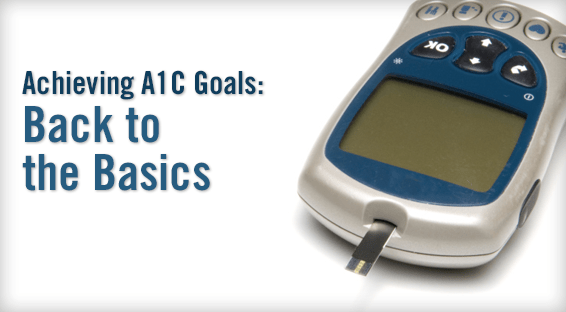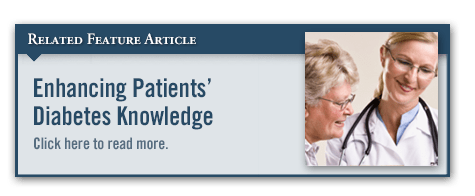Among the nearly 26 million Americans with diabetes, approximately half have not achieved an American Association of Clinical Endocrinologists (AACE)-recommended A1C goal of 6.5% or less. To address this issue, AACE and the American College of Endocrinology developed the Blood Sugar Basics: Get to Your Goals program. The program consists of an array of customizable tools and resources—available online and as hard copy materials—to encourage and empower patients with type 2 diabetes to know the importance of their A1C and work with their healthcare providers to set and achieve individualized blood sugar goals.
A Helpful Resource
Diabetes and its management can seem complex and overwhelming to patients, particularly for the newly diagnosed. “Patients need to understand that diabetes is a serious disease,” says Etie Moghissi, MD, FACP, FACE, the physician advisor for the Blood Sugar Basics program. “However, it’s important that they know that diabetes can be managed effectively when they’re engaged in their care.” To that end, the program—through its online home at www.bloodsugarbasics.com—provides downloadable checklists, tips for everyday management, videos, questions for patients to ask their providers, a quiz to test patients’ A1C knowledge, and more. In-depth information is provided on the importance of diet, exercise, medication (if prescribed), and monitoring and preventing symptoms. The resource also informs patients on hypoglycemia and how to avoid it.
The resources fall under three overarching missions:
1. Gather intelligence. “The program provides recommendations for controlling A1C and setting specific goals so that patients can have informed discussions with their providers,” explains Dr. Moghissi.
2. Finalize a strategy. “Patients should know how to achieve their A1C goals with lifestyle changes and by taking medications as prescribed,” Dr. Moghissi adds.
3. Regroup. Diabetes is a progressive disease that requires periodic reassessment to ensure that patients stay on track, says Dr. Moghissi. “If patients have not achieved their goals, it’s important to find out the reasons why,” she says. “In addition, patients should understand that not meeting their goal doesn’t mean they didn’t try hard enough. Patients can be empowered if they’re educated that medication adjustments are commonly needed to achieve long-term glycemic control.”
Collaboration Is Key
Dr. Moghissi stresses the importance of patients and providers working as a team to assess and achieve blood sugar goals and notes that the resources available through the Blood Sugar Basics website can help. “There are many reputable websites with diabetes information, but there is also a lot of misinformation,” she notes. “This program was produced by reputable organizations, including AACE—the world’s largest medical society dedicated to clinical endocrinology—and provides accurate, reliable information that can be trusted.”




 TimH
TimH